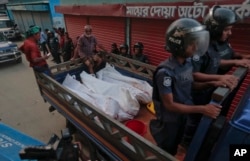After the Bangladeshi government made public its offer of cash to militants willing to reform, authorities say two members of a notorious terrorism group gave themselves up.
“We had chosen a dark path,” Abdul Hakim, one of those who surrendered, told a national television audience at a public ceremony last week where he received a check from a government official.
“We have realized our mistake,” said the 22-year-old Hakim. “We do not believe in terrorism. Everyone who has gone on this path should return.”
Hakim and Mahmudul Hasan Bijoy were among the first people to receive money under a new initiative that encourages extremists to lay down guns and renounce their radical paths. In return, those who turn themselves in will receive financial and legal assistance to help smooth their reintegration into the society.
The government handed over 500,000 Taka (about $6,350) to each of the two men who walked into a police station in northern Bogra city.
Police said the young men belonged to the Neo-JMB, an affiliate of the Islamic State and a splinter group of Jama’atul Mujahideen, considered one of the top terror organizations in Bangladesh.
“I have left that path. Please forgive me for what I have done and pray that I may be able to work for the country,” said Bijoy, 23, who offered apologies to the nation.
Bangladesh’s Home Minister Asaduzzaman Khan Kamal said on Monday that the two men “were still in police custody awaiting a trial. Their fate would be decided by the court which would be looking into if the two have committed any crimes.”
And while government officials were not specific, they said the men will be offered a rehabilitation program to keep them on the straight path.
Bangladesh is facing growing domestic threats from a variety of militant and extremist groups, including affiliates of Islamic State and al-Qaida. Terror attacks in recent months killed at least 70 Bangladeshis and some foreigners.
Militants in Bangladesh are often poor, uneducated and unemployed, or work in menial paying jobs. The government is hoping its high incentive payment - more than four times Bangladesh’s per capita income of about $1,300 – will entice many militants to come forward.
“If the militants want to come to the normal life, we will help them,” Benazir Ahmad, chief of the Rapid Action Battalion, told reporters in Dhaka last week.
But analysts say the payment strategy is risky and may not accomplish its intended goal – to curb terrorism and uproot militants.
“This strategy has been undertaken in other places such as Saudi Arabia and Indonesia as well,” said Ali Riaz, who teaches South Asian politics and political Islam at Illinois State University. “It can be done. But this alone is not going to help you in countering extremism. It should be backed up by many other steps and be part of a larger and more comprehensive deradicalization strategy.”
Saudi Arabia’s rehabilitation program, for example, isolates participants and provides months of therapy by moderate Islamic clerics and psychologists. The program has been criticized, though, for providing gourmet meals and cushy surroundings.
Analysts say the Bangladeshi government needs to reform the education system to provide better opportunities for young people susceptible to extremists’ recruiting. The government should encourage Muslim religious leaders to be part of the rehabilitation process to counter the extremists’ narrative, they say.
“I am deeply concerned that it might not work,” Riaz said. “Social and educational institutions that have the potential to radicalize need to be reformed. Is the society ready to accept the assimilation of militants? How can they be rehabilitated in the society? Without involving the society into the deradicalization process, it can be a challenge.”





